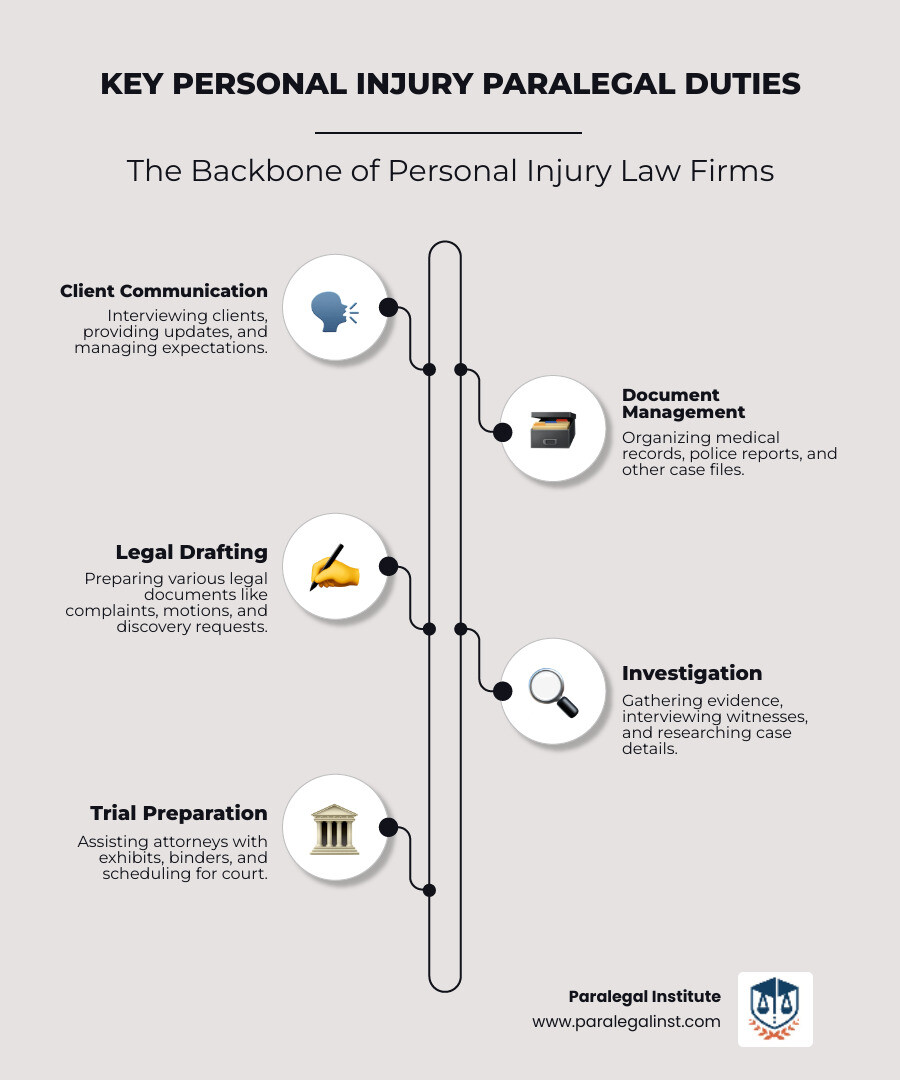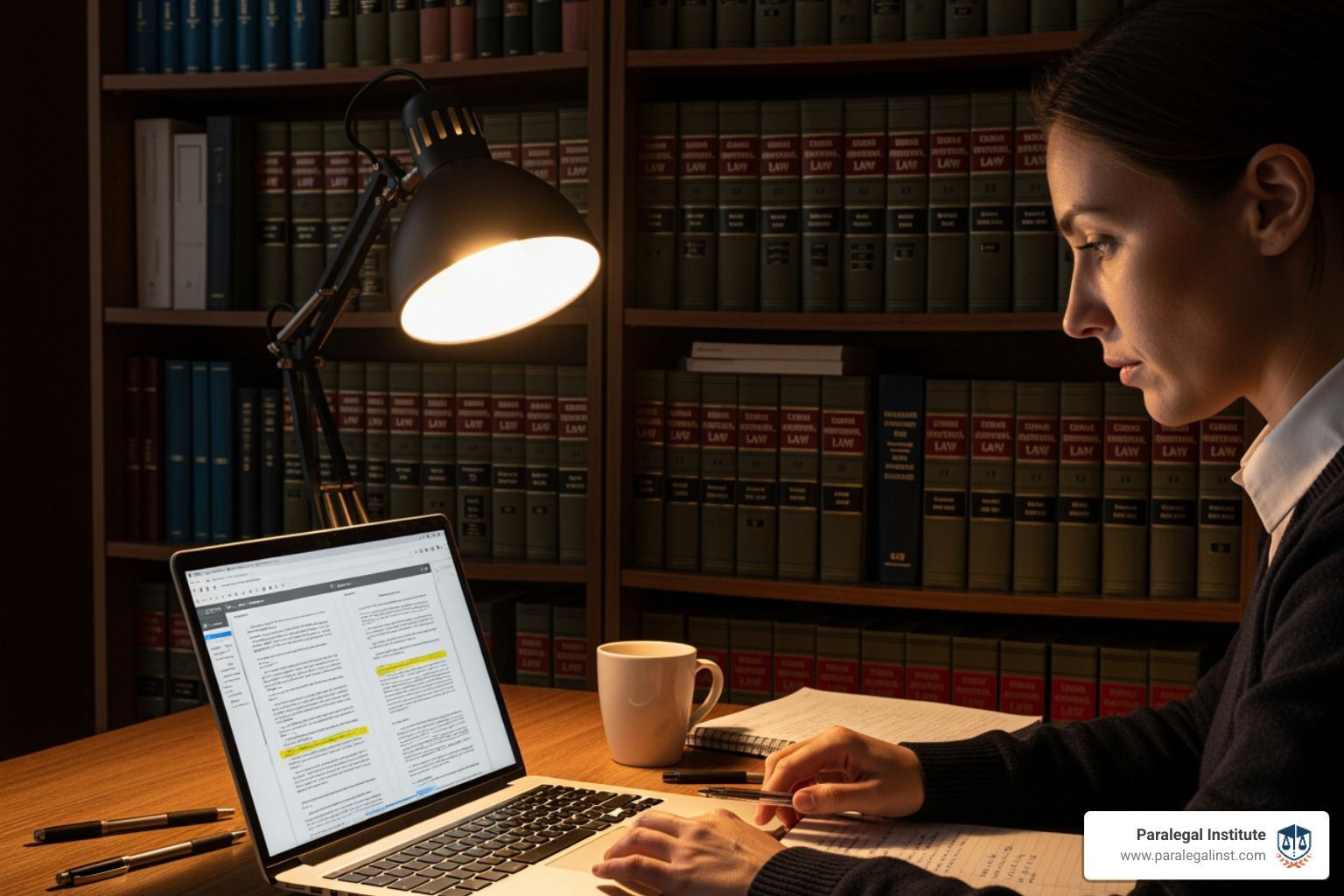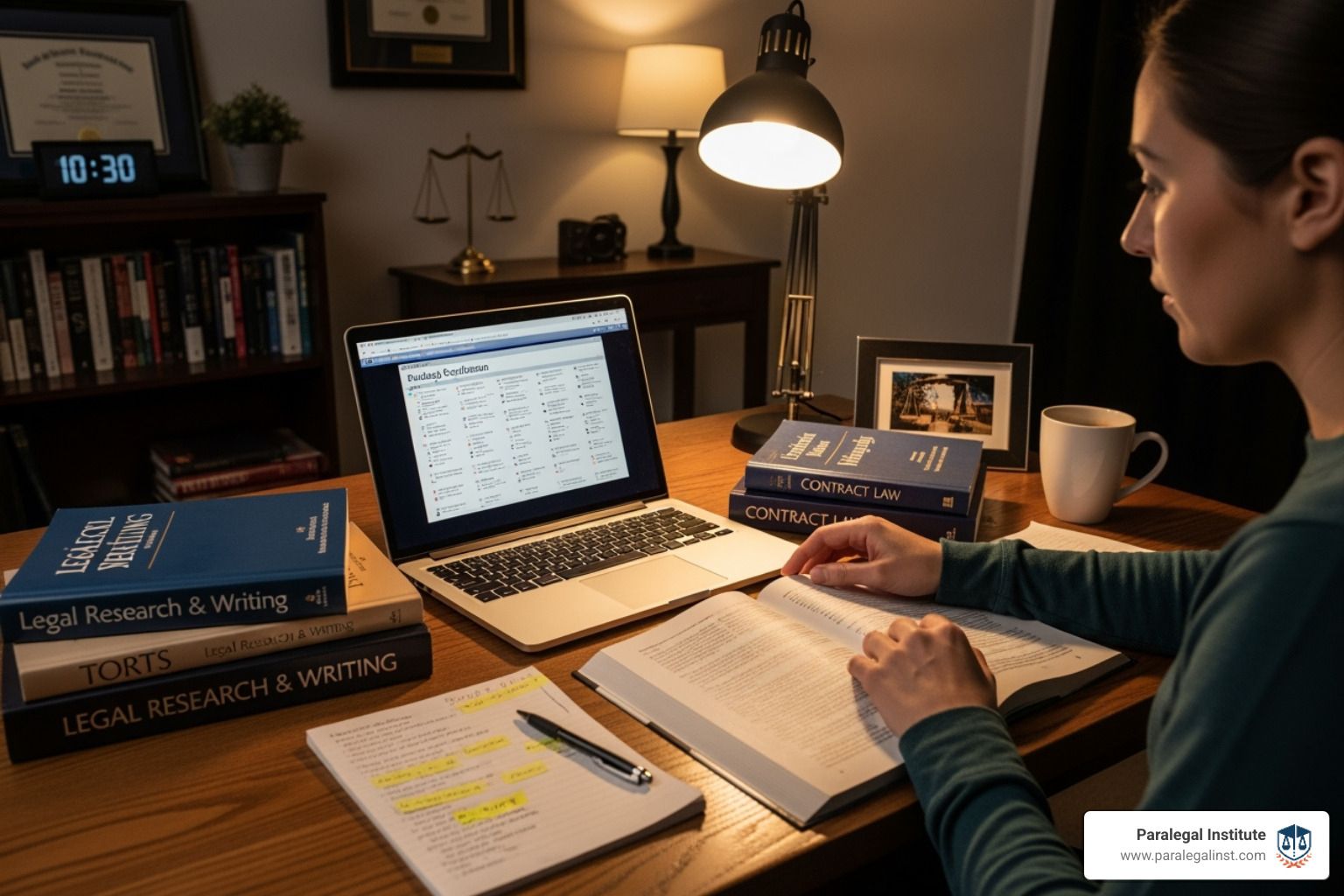Behind the Scenes: Personal Injury Paralegal Duties Explained
Understanding Personal Injury Paralegal Duties
If you're wondering about personal injury paralegal duties, you've come to the right place. These legal professionals are the backbone of personal injury law firms. They handle a wide range of tasks to support attorneys and help clients.
Here are the primary responsibilities of a personal injury paralegal:
- Client Communication: Interviewing clients, providing updates, and managing expectations.
- Document Management: Organizing medical records, police reports, and other case files.
- Legal Drafting: Preparing various legal documents like complaints, motions, and discovery requests.
- Investigation: Gathering evidence, interviewing witnesses, and researching case details.
- Trial Preparation: Assisting attorneys with exhibits, binders, and scheduling for court.
Personal injury paralegals are vital. They keep cases moving smoothly, allowing attorneys to focus on legal strategy. Their work ensures clients get the support they need during challenging times.
I'm Matthew Pfau, and as the owner of a medium-sized law firm that hires numerous paralegals, I've seen the critical importance of effective personal injury paralegal duties. My experience training these professionals inspired the development of the Paralegal Institute curriculum.

What is a Personal Injury Paralegal? The Backbone of the Firm
At the paralegal's core, they understand that a personal injury paralegal is an indispensable legal professional. They are the engine that keeps law firms running, providing essential assistance and support to attorneys, ensuring cases are managed efficiently and effectively. While the attorney may get the headlines after a big win, it’s often the paralegal who really gets their hands dirty!
A paralegal's role is to assist personal injury lawyers in the direct performance of their duties, helping handle claims for injuries or accidents caused by another party. This includes providing supportive aid to lawyers for court preparation and managing the intricate details of each case. Paralegals are paramount to the success of a personal injury case, enabling clients to steer complex legal processes from start to finish. You can learn more about the vital role of paralegals in law firms.
Personal injury cases fall under tort law and are heard in civil court. This means paralegals work with cases where someone has suffered harm due to another's negligence or wrongful act. The four key components of any personal injury claim are:
- A duty to act reasonably under the circumstances.
- A breach of that duty.
- The breach caused harm to another party.
- The harm has a monetary value.
Understanding these foundational principles is crucial for every personal injury paralegal. For a deeper dive, you can explore understanding tort cases.
One unique aspect of personal injury law is that paralegals can work on either the plaintiff side or the defendant side. This distinction significantly shapes our daily personal injury paralegal duties.
| Task Category | Plaintiff-Side Paralegal (Representing the Injured Party) | Defense-Side Paralegal (Representing the Accused Party/Insurer) |
|---|---|---|
| Client Interaction | Interviewing injured clients about their experiences, providing updates, empathetic communication. | Interviewing clients (often the insured or company representatives), gathering their version of events. |
| Evidence Gathering | Gathering medical records, police reports, witness statements, photographs of injuries/scene. | Reviewing police/witness reports, obtaining medical examination appointments for the defendant's side. |
| Document Drafting | Preparing settlement demands, complaints, interrogatories, motions, and witness lists. | Drafting responses to complaints, preparing counter-interrogatories, and defense motions. |
| Case Goal | Maximizing client compensation for injuries and losses. | Minimizing liability and financial exposure for the defendant. |
Regardless of which side we are on, a paralegal's goal remains the same: to ensure a smooth legal process and help our clients steer what is often a very challenging time in their lives.
A Comprehensive Look at Personal Injury Paralegal Duties
So, you're curious about the day-to-day life of a personal injury paralegal? The truth is, working in a personal injury firm means you'll be a master of multitasking and managing many cases at once. It's not unusual to be juggling 45 active clients who are undergoing medical treatment, or even more than 80 open files at any given time! This kind of pace truly calls for top-notch organizational skills and a real knack for prioritizing tasks. We have to be on top of every detail, ensuring nothing important ever gets missed. If you're looking for some smart tips on how to handle it all, you can check out how to prioritize tasks effectively as a paralegal.
Client Interaction and Communication

One of the most heartwarming, yet sometimes challenging, personal injury paralegal duties is connecting with clients. Often, a paralegal is the very first person a potential client speaks with. Paralegals conduct initial interviews, carefully screening cases and gathering that crucial first bit of information. This often means asking questions that are quite personal and sensitive. A paralegal's clients are typically going through a tough time due to their injuries or losses, so we approach these conversations calmly and with deep empathy. The paralegal's goal is to gather facts, of course, but always with a compassionate ear.
Once a case is underway, we become the main link between the attorney and the client. This means paralegals are constantly in touch: providing updates on how things are progressing, explaining the next steps in their journey, answering any non-legal questions they might have, and gently managing their expectations. It’s a role that demands excellent communication skills and a big dose of understanding, especially when emotions are running high. Sometimes, paralegals find ourselves being a trusted confidant, actively listening to clients who are experiencing a lot of physical and emotional pain. Paralegals truly are paid to listen to clients, and that's something they should never forget!
Investigation and Evidence Gathering
Building a strong personal injury case really hinges on thorough investigation and gathering all the right evidence. The personal injury paralegal duties in this area are pretty comprehensive!
Paralegals start by obtaining all sorts of reports: police reports, accident reports, and witness statements. This often involves reaching out to various agencies and individuals. Paralegals also play a key role in collecting and organizing photographs of the accident scene, any vehicle damage, and, of course, the client's injuries. These visual pieces of evidence are incredibly important.
A huge part of a paralegal's job revolves around medical records. Paralegals order them, review them carefully, and then summarize them for discovery. This is a very detailed process where they track down records from many different healthcare providers, making sure nothing is missing. Then, paralegals create clear summaries or timelines that highlight the most important parts of the client's treatment and injuries. And yes, paralegals keep a close eye on all those medical bills and expenses too!
Lastly, paralegals conduct important legal research. This can involve looking into defendants, relevant case law, and past cases that set precedents for our specific situation. Having a solid foundation in research is super important for this role. If you're keen to learn more, our Legal Research Guide for Paralegals is a fantastic resource. All this investigative work ensures that attorneys have absolutely all the information they need to build a compelling case.
Document and Case File Management
Keeping things incredibly organized is absolutely essential for a personal injury paralegal. The personal injury paralegal duties in this area are the unsung heroes of case success.
Paralegals are responsible for creating and maintaining both physical and digital case files. This means every document, from that first client intake form to complex medical reports and court filings, is correctly categorized, indexed, and easy to find. Imagine a well-oiled machine – that's what we aim for with the files!
Perhaps one of the most critical responsibilities is calendaring deadlines. Paralegals carefully track and mark all important dates. The most vital one? The statute of limitations, which is the legal time limit to file a lawsuit. Missing this deadline can unfortunately lead to a case being dismissed, which is something we work tirelessly to prevent. Paralegals often set multiple reminders for our attorneys to ensure no deadline is ever, ever missed. This includes everything from discovery responses to hearing dates and mediation appointments.
To help us with this high-volume work, paralegals frequently use specialized case management software. This technology is a game-changer, helping us streamline our workflow, keep track of communications, and manage documents efficiently. It's truly indispensable for handling the many cases typical in personal injury law. For more great tips on staying super organized, be sure to check out our Strategies for Paralegals to Stay Organized.

Drafting, Discovery, and Trial Support
Beyond the important tasks of investigation and organization, personal injury paralegal duties also dive deep into the technical side of legal work. This is where paralegals become the attorney’s right hand, supporting them through every twist and turn of the legal process, from the initial stages all the way to trial. It’s a bit like being a skilled co-pilot, making sure the legal flight goes smoothly!
Key Pre-Litigation Personal Injury Paralegal Duties
Many personal injury cases are actually resolved before they ever see a courtroom. This "pre-litigation" phase is incredibly important, and our tasks here are crucial for setting the stage for successful negotiations. Think of it as preparing a delicious meal – all the prep work happens before the main course!
A big part of what we do is drafting demand letters. These are comprehensive documents that clearly outline our client's injuries, their treatment journey, all their losses (like lost wages or pain and suffering), and a proposed settlement amount. We back this up with all the supporting evidence we've gathered. We also spend time preparing settlement packages, which means compiling all the necessary documents – medical records, bills, wage loss statements, and other vital evidence – into a compelling package for insurance adjusters or the opposing legal team.
Another key responsibility is negotiating medical liens. This is a super important part of our role! We work to negotiate down outstanding medical bills with providers or insurance companies. Getting these liens reduced can significantly increase the amount of money our client actually receives from their settlement. We also handle drafting initial correspondence, sending out various letters to clients, medical providers, and insurance companies to get the ball rolling. If you’re looking to master the art of crafting these important documents, our Paralegal Writing Bootcamp can be a huge help.
Essential Litigation-Phase Personal Injury Paralegal Duties
Sometimes, despite best efforts, a settlement isn't reached in the pre-litigation phase. When that happens, the case moves into formal litigation, and our personal injury paralegal duties shift to more formal legal processes. This is where things get truly exciting, and paralegals get to flex their legal muscles even more!
Paralegals take on tasks like drafting pleadings – these are formal court documents such as complaints to kick off a lawsuit, answers to complaints from the other side, and various motions that ask the court to do something specific. Paralegals also handle drafting discovery requests. This includes preparing things like interrogatories (written questions for the other side), requests for production (asking for documents), and requests for admissions (asking the other side to admit certain facts). And, of course, paralegals help prepare our client's responses to similar requests from the opposing side.
Once depositions (sworn out-of-court testimony) happen, paralegals often summarize the transcripts. This means sifting through pages of testimony to highlight key admissions or inconsistencies for the attorney, making their review much more efficient.
Then comes trial preparation, which is an intense but incredibly rewarding part of the job. Paralegals assist with organizing exhibits, coordinating witnesses, and preparing trial binders (often multiple, massive volumes!). Paralegals ensure every single document is perfectly ready for court. It’s a huge undertaking, but seeing it all come together is truly satisfying. Finally, paralegals might even find themselves assisting the attorney in court, providing real-time support by managing documents, exhibits, and notes, ensuring the attorney has everything they need right at their fingertips. Mastering your legal writing skills is absolutely essential for all these tasks, and you can learn more about improving your legal writing skills through our programs.

Specialized Knowledge and Skills for Success
To truly shine in your personal injury paralegal duties, you'll need a special mix of skills and knowledge. It's not just about knowing legal terms; it's about understanding the human side of things and being incredibly organized. Our training at Paralegal Institute is all about building practical skills. We want you ready for the workforce right away! You can explore more about the importance of building practical skills in paralegal training.
Foundational Medical Knowledge
You might be surprised, but for a personal injury paralegal, sometimes knowing the medicine is even more important than knowing every single law! Our attorneys truly rely on us to help them understand the medical side of each case. This means we need a solid grasp of basic human anatomy so we know where injuries are located and how they impact the body. We also become very familiar with common injuries often seen in personal injury cases, like broken bones, whiplash, or spinal issues.
A big part of the job is learning how to read medical charts and comprehend complex medical records, doctor's notes, and diagnostic reports. Medical professionals use a lot of shorthand, so understanding common medical abbreviations is absolutely vital. Think of terms like "fx" for fracture, "dx" for diagnosis, "Rx" for prescription, or "hx" for history. Knowing what medical terms like radiculopathy mean can make all the difference. For example, knowing the difference between a distal and a proximal fracture might even change the entire value of a case! That's why we often recommend diving into medical school study guides or anatomy books.
Critical Soft Skills and Tech Savviness
Beyond all that specialized medical know-how, a top-notch personal injury paralegal needs a robust set of "people skills" and a knack for technology. First and foremost, attention to detail is non-negotiable. Every tiny detail matters, whether you're reviewing lengthy medical records or drafting precise legal documents. We can't stress enough the importance of Attention to Detail in Paralegal Work.
With so many cases and deadlines, organization is your best friend. You'll need strong organizational skills to manage files, documents, and calendars efficiently. Excellent communication skills are also a must, both in writing and speaking. This helps you connect with clients, draft clear documents, and work smoothly with attorneys and court staff. You're handling incredibly sensitive client information, so maintaining strict confidentiality and understanding HIPAA laws is absolutely paramount.
You'll also be a key part of the team, so strong teamwork skills are essential. And when it comes to juggling a high volume of tasks and deadlines, superb time management and prioritization are key. You'll often need to decide what's most urgent, especially when a statute of limitations (the legal deadline to file a lawsuit) is looming! Lastly, don't forget judgment. You'll be making informed decisions and anticipating needs, which comes with experience and good training. And in today's world, being tech-savvy is a given. You'll need to be comfortable with Microsoft Office Suite and specialized case management software. Plus, staying up-to-date with new technologies, including AI for Paralegals , is becoming incredibly valuable!
Frequently Asked Questions about Personal Injury Paralegal Work
Working as a personal injury paralegal brings unique rewards and challenges. After years of training paralegals for this field, we've heard countless questions about what the job really entails. Let me share some honest answers about what you can expect.
How much do personal injury paralegals interact with clients?
Here's something that surprises many new paralegals: you'll probably talk to clients more than the attorney does! Extensive interaction is a huge part of personal injury paralegal duties.
You become the primary point of contact for case updates and information gathering. Clients call you when they have questions about their treatment, when they're worried about a bill, or when they just need someone to listen. You're the one conducting those initial intake interviews, gathering all those personal details about the accident and injuries.
Building rapport and trust is crucial because clients need to feel comfortable sharing intimate details about their pain, their fears, and their financial struggles. Sometimes you'll find yourself on the phone for an hour with a client who just needs reassurance that their case is moving forward.
The relationship can get quite personal. You'll know about their family situations, their work struggles, even their relationship problems - because all of these factors can impact their case. It's rewarding work, but it requires strong boundaries and excellent communication skills.
What is the difference between a paralegal and a case manager in a PI firm?
This is where things get interesting - and a bit confusing! The roles often overlap significantly, and every firm structures things differently.
Paralegals typically have broader legal training and handle more complex legal tasks. We draft pleadings, conduct legal research, prepare discovery responses, and assist with trial preparation. Our training covers legal procedures, court rules, and document drafting.
Case managers often focus on pre-litigation client coordination and medical treatment tracking. They might spend more time calling doctors' offices, scheduling appointments, making sure clients are following through with their treatment, and handling the administrative side of cases.
But here's the reality: roles can overlap significantly depending on the firm's structure. In smaller firms, you might wear both hats. Some firms even call the position a "hybrid paralegal/legal assistant." You could be drafting a motion in the morning and calling a client about their physical therapy appointment in the afternoon.
The key difference usually comes down to the complexity of legal documents you're allowed to draft and the depth of legal analysis you're expected to perform. But both roles are essential to keeping personal injury cases moving smoothly toward resolution.
Conclusion: Launching Your Career in Personal Injury Law
So, we've walked through the ins and outs of what it means to be a personal injury paralegal. It's clear that this role is incredibly demanding, yes, but it's also wonderfully rewarding. Think of us as the unsung heroes working diligently behind the scenes. We're the ones making sure justice gets served and that injured individuals receive the support and compensation they truly deserve.
Our personal injury paralegal duties are super diverse. They ask for a special mix of legal smarts, a good grasp of medical details, top-notch organizational skills, and a warm, empathetic way of talking to people. It’s a lot, but it’s also what makes the job so impactful!
If you're dreaming of a career where you can genuinely make a difference in people's lives, and you love being in a , detail-oriented environment, then becoming a personal injury paralegal could be your perfect fit. To truly shine in this field, it all comes down to having practical, hands-on skills that get you ready for the real world of legal practice.
That's exactly where the Paralegal Institute comes in! Our 15-week paralegal certificate program is built just for that. It's accelerated, hands-on, and designed to equip you with the practical skills you'll need for immediate entry into the workforce. We focus on real-world applications, making sure you're ready to tackle all those diverse personal injury paralegal duties from day one. Want to learn more about how we can help you kickstart this exciting career? Explore our legal support staff training today!










